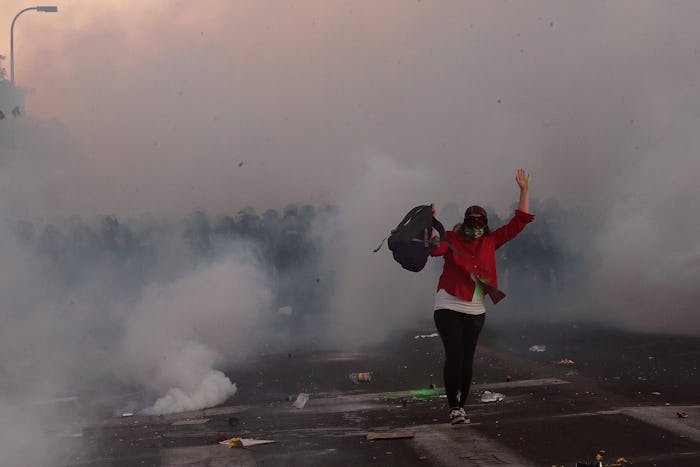News

Tear Gas Has Been Linked To Miscarriage, So Why Are Police Still Using It?
The use of tear gas as a crowd-control agent has come under increasing scrutiny amid nationwide protests against police brutality and systemic racism. Health officials have repeatedly warned that tear gas can have long-term health consequences and there is some evidence that suggests tear gas could even cause miscarriages. So why are police still using it?
Although prolonged exposure to riot control agents like tear gas can have severe consequences like blindness, glaucoma, respiratory failure, and even immediate death due to chemical burns in the throat and lungs, according to the Centers for Disease Control and Prevention (CDC), tear gas remains completely legal for law enforcement agencies to use, despite it being banned in war.
Beyond the CDC's warnings, a systematic review of 31 medical studies conducted by the U.S.-based non-profit Physicians for Human Rights found that of 5,131 people reported suffering injuries as a result of chemical irritants like tear gas; two people died while another 70 were left with permanent disabilities.
What this report from 2016 on the health consequences of crowd-control weapons doesn't dive into, however, is the specific effects tear gas can have on pregnant people. An it's a topic Dr. Michele Heisler, the medical director of Physicians for Human Rights and a professor of internal medicine and public health at the University of Michigan, tells Romper needs more research.
"While there are well-documented severe injuries and deaths from chemical irritants, there is scant rigorous experimental or epidemiological research into the impacts of tear gas on pregnancy-related outcomes," Heisler says. "That being said, despite the lack of research, we know that tear gas is inherently indiscriminate and law enforcement should only use this crowd-control weapon as an absolute last resort, when all methods of peaceful resolution have been exhausted."
In Seattle, city and police officials agreed to institute an immediate 30-day ban on the use of tear gas against protesters while watchdog groups reviewed cops' crowd-management strategies. Just two days after agreeing to the ban, however, Seattle Police deployed tear gas against demonstrators during an evening protest. It was, of course, not the first time police have used tear gas during recent protests. Earlier this month, Philadelphia Police Commissioner Danielle Outlaw defended officers' use of tear gas against more than 100 protesters marching on the I-676 expressway by citing tear gas as "a means to safely diffuse a volatile and dangerous situation, and restore order."
But is it safe? Medical professionals say there are multiple reports suggesting the crowd-control agent can have harmful effects. In an email to Romper, Dr. Daniel Grossman, a professor in the University of California, San Francisco's Department of Obstetrics, Gynecology and Reproductive Sciences and director of Advancing New Standards in Reproductive Health within the UCSF Bixby Center for Global Reproductive Health, cited a report from Turkey that suggested "women had more serious respiratory effects of tear gas than men" as well as "reports from several countries that tear gas is associated with an increased risk of miscarriage and intrauterine fetal death."
In 2012, Physicians for Human Rights reported that, following the use of tear gas by government forces in Bahrain, "several women who had miscarried reported that their doctors said they had noticed a significant rise in miscarriages in neighborhoods where tear gas was used frequently." In a 2017 report on the health impacts of chemical irritant crowd-control weapons, the nonprofit noted that there had been "some cases reports" that suggested chemical irritants like tear gas and pepper spray could have adverse effects on the fetus during pregnancy.
"Animal models indicate that miscarriages and fetal abnormalities can occur after exposure to [chemical irritants]," the report noted. "There is insufficient population data to verify a causal link in humans, but there are case reports of miscarriage and teratogenic effects on the fetus secondary to exposure to high concentrations of [chemical irritants]."
Physicians for Human Rights isn't the only organization to suggest there's a link between tear gas exposure and miscarriage. In 1988, the United Nations attributed "dozens" of miscarriages to tear gas fired by Israeli soldiers against Palestinian demonstrators. In 2011, Chile temporarily banned the use of tear gas against protesters after a University of Chile study showed chlorobenzylidene malonontrite, a common component of tear gas, might cause miscarriages.
Still, although these reports exist, Grossman tells Romper "there are few published studies about the safety and harmful effects of tear gas in general, and even less about the effects on pregnant people."
So why, if tear gas has been banned in warfare, is it still completely legal for law enforcement to use it against civilians? Although the Chemical Weapon Convention barred the use of chemical weapons like tear gas in warfare, it also classified tear gas as a "riot control agent" acceptable for use by law enforcement in purposes "not prohibited under this Convention" such as "domestic riot control purposes."
Despite the lack of rigorous research on tear gas' impact on pregnancy, Heisler cautions that people who are pregnant should, like anyone else with an underlying health condition, be careful in when in settings where tear gas may be used by law enforcement. "Pregnant women, as well as anyone with underlying health conditions should also exercise caution in situations where chemical irritants may be deployed."
Experts:
Dr. Daniel Grossman, MD, professor at University of California, San Francisco's Department of Obstetrics, Gynecology and Reproductive Sciences and director of Advancing New Standards in Reproductive Health (ANSIRH) within the UCSF Bixby Center for Global Reproductive Health
Dr. Michele Heisler, Physicians for Human Rights medical director; professor of internal medicine and public health at University of Michigan